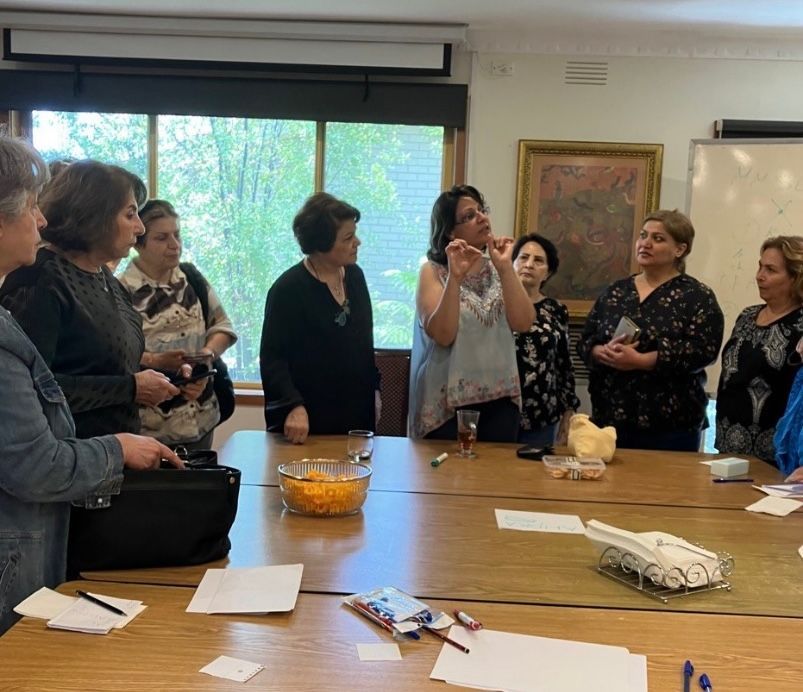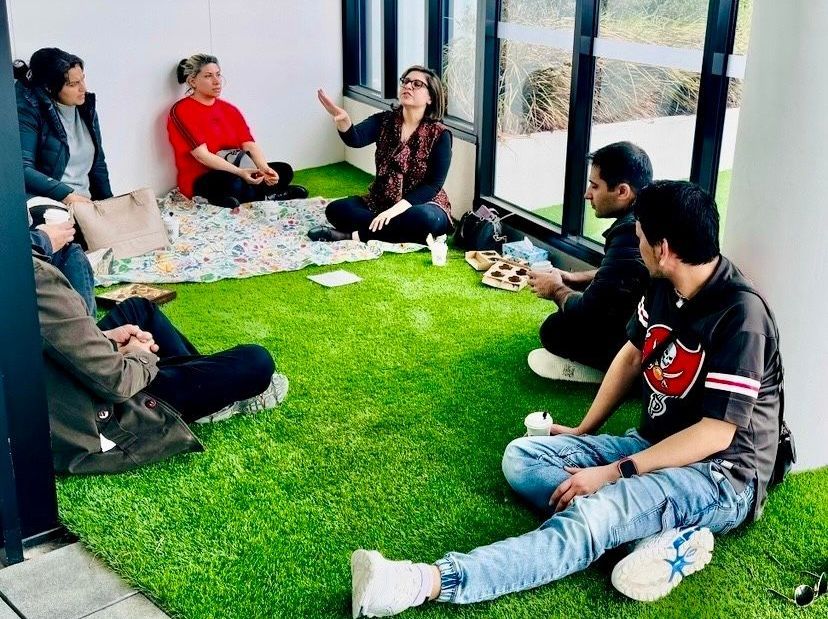Workshops & Education
Who Are Phsycology Workshops For
We provide a range of Mental well-being workshops for different range of age.
This is a proven methodology to help you develop resilience in your own personal life and the workplace/school.
- Workshops
- Toddlers (1-5)
- Kids (6-12)
- Teenagers (13-18)
- Young parents with kids
- Middle age (40-60)
- Seniors (60 years and above)
What are Psychology Workshops & Education
Psychology workshops and education programs are structured sessions designed to provide participants with knowledge, skills, and tools to improve their mental well-being, enhance coping strategies, or understand psychological concepts.
These programs are often led by psychologists, mental health professionals, or educators and can be tailored for various audiences, including individuals, families, professionals, and specific community groups.
Workshops and education programs promote mental health awareness, prevent mental health issues, and support personal development.
Features of Psychology Workshops and Education Programs
Educational Focus
Psychology workshops and education programs are designed to educate participants about specific psychological topics. These could range from mental health conditions, such as anxiety and depression, to self-care techniques, stress management, communication skills, or conflict resolution.
The aim is to provide participants with valuable knowledge to apply in their personal or professional lives.

Interactive and Practical Approach
Unlike traditional classroom education, workshops are often interactive and hands-on. Participants may engage in group discussions, role-playing exercises, case studies, or other activities that allow them to apply what they have learned. This practical approach helps participants internalise and practice new skills in a supportive environment.
Structured Curriculum
Psychology workshops and education programs usually follow a structured curriculum. The program is organised into clear topics or modules that guide participants through learning. Each session may focus on a specific aspect of the topic, building upon previous lessons to provide a comprehensive understanding.
For example, a stress management workshop might start by explaining the science behind stress, move on to identifying individual stress triggers, and conclude with teaching coping mechanisms such as relaxation techniques or time management skills.
Targeted at Different Groups
These workshops and programs can be tailored for specific audiences, including:
- Individuals seeking personal development: Focusing on self-improvement, emotional regulation, or resilience-building.
- Parents and families: Offering guidance on parenting strategies, communication skills, and dealing with family challenges.
- Professionals in high-stress occupations: Teaching techniques for stress management, mental health awareness, or work-life balance.
- Schools and educational institutions: Addressing children’s mental health, bullying prevention, and social-emotional learning.
Mental Health Promotion
Psychology workshops often focus on promoting mental health and well-being. Topics can include:
- Stress management: Helping individuals recognise and manage stress in healthy ways.
- Emotional intelligence: Teaching people how to understand and regulate their emotions, as well as how to empathise with others.
- Mindfulness and relaxation: Introducing participants to mindfulness practices, meditation, and relaxation exercises that can reduce anxiety and promote mental clarity.
- Work-life balance: Providing strategies to balance the demands of work, family, and personal life healthily.
- Coping with change and adversity: Helping participants build resilience to handle life’s challenges, such as career transitions, health issues, or relationship changes.

Skill Development
Workshops and programs often focus on developing specific skills to improve mental health and interpersonal relationships. For example:
- Communication skills: Teaching effective communication strategies to improve relationships at work, home, or social settings.
- Conflict resolution: Helping participants learn techniques to resolve disputes and manage disagreements constructively.
- Problem-solving: Offering methods for effective decision-making and overcoming obstacles.
- Time management and organisation: Providing tools to manage time better and reduce stress related to busy schedules.
Prevention and Early Intervention
Psychology workshops and education programs can play a key role in preventing mental health issues or providing early intervention. By educating participants about common mental health challenges and how to recognise symptoms, these programs can empower individuals to seek help before problems escalate. For example:
- Youth mental health workshops: These programs teach children and teens about mental health, helping them recognise feelings of anxiety, depression, or stress and equipping them with strategies to manage these emotions.
- Workplace mental health programs: These programs focus on preventing burnout, recognizing signs of mental strain, and promoting a mentally healthy workplace culture.
Personal Development and Growth
Some workshops are designed to help participants in their journey of personal development. These programs may focus on self-esteem, building confidence, goal-setting, or mindfulness practices. These workshops help participants better understand themselves, develop self-awareness, and foster a growth mindset.

Group Learning and Peer Support
One key feature of psychology workshops is the opportunity for group learning. Participants benefit from the collective knowledge and experiences of others in the workshop. Group discussions provide diverse perspectives, and sharing personal stories can lead to greater insights and support.
This peer interaction helps create a sense of community and can foster lasting connections among participants.
Professional Development
Psychology workshops are often tailored for professionals in various fields, offering them skills to support their work and manage their mental well-being.
Common examples include:
- Workshops for healthcare professionals: Focusing on managing work-related stress, avoiding burnout, and developing skills to support patients with mental health concerns better.
- Leadership training: Providing managers with tools to promote mental wellness in the workplace, support employee mental health, and improve leadership skills.
- Workshops for educators: These workshops will equip teachers with strategies to support students' mental health and well-being while also managing their own stress.
Types of Psychology Workshops and Education Programs
Workshops and education programs cover a wide range of topics. Some of the most common include:
- Mindfulness and Stress Reduction Workshops: These workshops teach participants how to reduce stress, increase focus, and improve mental clarity through mindfulness practices such as meditation and breathing exercises.
- Parenting Workshops: Offering guidance to parents on effective parenting techniques, child development, and managing behavioural issues.
- Mental Health First Aid Programs: Teach individuals how to recognise the signs of mental health issues in others and provide initial support before professional help is available.
- Resilience and Coping Skills Programs: Providing tools and strategies to help individuals manage life’s challenges, such as job loss, illness, or family changes.
- Self-Esteem and Confidence Building Workshops: These workshops help participants develop a positive self-image and build confidence in their personal and professional lives.
- Trauma-Informed Care Programs: Offering training to healthcare providers, educators, and other professionals on supporting individuals who have experienced trauma.
Workshops for Specific Mental Health Conditions
Some programs focus on education and coping strategies for specific mental health conditions, including:
- Anxiety management: Teach participants about anxiety and how to manage it through coping techniques such as CBT, relaxation, and lifestyle adjustments.
- Depression awareness: Providing information on the symptoms of depression, how to recognise them in oneself or others, and how to seek help.
- Addiction recovery programs: Focusing on overcoming addiction, building healthy habits, and creating a support network for recovery.
Online and In-Person Formats
Psychology workshops and education programs can be delivered in various formats:
- In-person workshops: Typically held in a group setting, such as a community centre, workplace, or school. These sessions often foster stronger personal connections and provide opportunities for hands-on activities.
- Online workshops: Delivered via videoconferencing or pre-recorded sessions, these allow participants to access the content from the comfort of their own homes. Online programs may include interactive elements such as live Q&A sessions, discussion forums, or group chats.
Duration and Flexibility
The length of psychology workshops and education programs varies. Some are short, one-time events that last a few hours, while others are part of several sessions over several weeks or months.
This flexibility allows participants to choose programs that fit their schedules and needs.
About
Conditions
Treatments
All Rights Reserved | A Peace Corner




